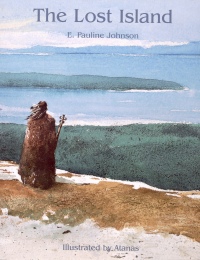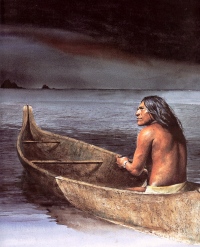| ________________
CM . . .
. Volume XII Number 4 . . . .October 14, 2005
excerpt:
The Lost Island is one of the stories found in Pauline Johnson's Legends of Vancouver. Johnson was born in 1861 of mixed heritage: her father was a distinguished Mohawk chief named George Johnson, her mother an English woman by the name of Emily Howells. She is said to have been equally proud of both sides of her family. A well known poet and lecturer, she settled in British Columbia after her retirement in 1909, and it was here that she produced this first collection of West Coast legends told in English by a native artist. This story tells of a powerful medicine man who had a dream of the future city of Vancouver which would be built on native land. As Johnson describes it: "Between the two narrow strips of salt water the white man will camp, many hundreds of them, many thousands of them." Despite all of the medicine man's power and bravery, he knew he could not prevent this happening, and so, when he was dying, he transferred all his courage to the Lost Island and told his people that they must never stop searching for it. The narrator, a native elder, says he has spent his life searching for the island, but he has seen only its shadow on the water. This story is really a lament for not only the land and forests which the native people have lost but for their independence and fearlessness as well. In the myth, one day they will find the Lost Island and, in the finding, will regain their courage and self-confidence.
The Lost Island is a significant legend from a well known early Canadian author, but the most stunning thing about this book, however, is the artwork. Atanas Matsoureff, who identifies himself merely as Atanas, was born in Bulgaria, and this is his first picture book. His watercolour paintings are outstanding, ranging from tranquil landscapes to detailed portraits of the native people. Atanas has used natural colours: greens, blues and browns, to depict the beauty of the West Coast scenery and his misty scenes of sky and water have just the right magical quality to them. This would be a good book to use when studying Legends and Myths because it relates to the present-day City of Vancouver. It could also be used in a study of Canadian authors or for an examination of art in picture books. Highly Recommended. Helen Norrie, a former teacher-librarian, writes the monthly Children's Books column for the Winnipeg Free Press.
To comment
on this title or this review, send mail to cm@umanitoba.ca.
Copyright © the Manitoba Library Association. Reproduction for personal
use is permitted only if this copyright notice is maintained. Any
other reproduction is prohibited without permission.
NEXT REVIEW |
TABLE OF CONTENTS FOR THIS ISSUE
- October 14, 2005.
AUTHORS |
TITLES |
MEDIA REVIEWS |
PROFILES |
BACK ISSUES |
SEARCH |
CMARCHIVE |
HOME |

 Johnson's prose shows her poetic background in such passages as this one: "He could go for many days without food; he could fight the largest mountain lion; he could overthrow the fiercest grizzly bear; he could paddle against the wildest winds and ride the highest waves."
Johnson's prose shows her poetic background in such passages as this one: "He could go for many days without food; he could fight the largest mountain lion; he could overthrow the fiercest grizzly bear; he could paddle against the wildest winds and ride the highest waves."